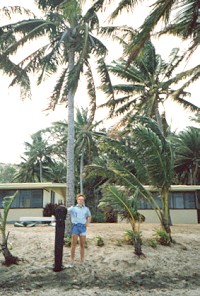
Fiji is claimed to be a paradise, but to explore a paradise isn't always easy, and here are some of the challenges:
Once known as the `Cannibal Isles'
Ethnic conflicts
Government coups
Cyclones
Idyllic environments and a tropical climate
Opportunities for diving and snorkelling
Traditional rituals as mekes narrative dances, kava drinking ceremonies and walking on burning stones, lovo cooking (underground hot rock oven)
10th August 1987: I had just landed in Sydney (Australia) after a longer journey in the Far East. The first thing I wondered about was how do I get to Fiji? People warned me about the unstable political situation there. There had recently been a government coup in Fiji, but despite this I didn't give up my efforts to go there as soon as possible.
My attitude was very naive at this time, and I asked myself: how can things be so bad in a world where such beauty exists. Surely this could not be a real coup?
Photo: Dancing the night away with the natives was just what I looked for.
The tense political situation, government coups, terrible rumours and uncertanty reminded us about that we should be careful. But when we saw the paradise, we forgot this soon. So we said to ourselves: Don`t worry, be happy.
Photo: Dramatic coups here? How can things be so bad in a world where such beauty exists? Anytime, I enjoyed myself here without too much trouble.
A new coup this year (in 2000) - echoes of 1987
The latest coup attempt in May this year, started one year after Mr. Chaudry became the national president. The coup leader, George Speight, claims to give indigenous Fijians to control their own destiny once and for all. Many ethnic Fijians feel that they have been discriminated against and lost rights.
There are many similarities here to what happened in Fiji 13 years ago when I was there. At this time Colonel Rabuka led armed soldiers into parliament and arrested the prime minister. Another interesting thing about what is happening there now, is that Mr. Speight's father, Sam Speight, is a member of parliament, and has good contact with Colonel Rabuka.
Immigrants To understand what is really happening today, we have to go way back in history. Fiji has many immigrants. Indians started coming to Fiji as labourers on sugar plantations at the end of the 19th century, when Fiji was a British colony.
In 1970, when Fiji became independent, ethnic Indians were in a majority. But after the coups in 1987, many Indians, especially the skilled, left the country, and now 51% of the 800,000 population are indigenous Fijians. Entering the coup area.
Since the situation was quite uncertain my two travel companions Geir and Sigbjorn, and I, bought flight tickets for almost nothing (300 Australian dollar; very cheap at this time). The prices have been cut down dramatically due to the instability in Fiji. There were unusually few passengers on the plane.
When we landed in Suva, Fiji's capital, at the entrance we were checked thoroughly by the customs officers who searched specially for guns. Finally they let us into the country. I guess we didn't look too suspicious. Due to the chaotic circumstances the Tourist Office couldn't help us much at that time.
We marched right out of the airport hall, which was fully packed with people who waited to get out of the country. When they noticed us moving in the opposite direction their eyes widened and I am sure they wondered; don't these people know there is a coup attempt going on? We felt the tension immediately. The situation was really unsafe, and we didn't know how far this would go. It was like a state of emergency.
We wouldn't be involved in any political discussion there, but we had to find out more about what was happening. We talked discretely to local people from different groups to obtain information. They had totally different views, and after a while I could understand better why the situation was so tense.
Background for the conflicts and the coups
It is so complicated, that it is not easy to explain briefly. Indigenous Fijians referred to Indians as Kai India or Fiji Indians, and to white people as Kai Valagai. In recent years many citizens of Indian descent referred to themselves as "Indo-Fijians", but the indigenous Fijians didn't like that. Indigenous Fijians refer to themselves as "i taukei" literally "owners of the land" and retained communal ownership of 87 percent of all of Fiji's land area.
These divisions caused the dramatic coups in 1987. A Fijian-dominated army took over the government control after the country's first Indian national president had been elected.
Follow the continuing in part 2: watch photos from the paradise!
Stein Morten Lund, 19 July 2000
